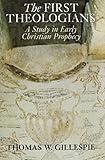The first theologians : a study in early Christian prophecy / Thomas W. Gillespie.
Material type: TextPublication details: Grand Rapids, Mich. : Eerdmans, c1994.Description: xiv, 286 p. ; 24 cmISBN:
TextPublication details: Grand Rapids, Mich. : Eerdmans, c1994.Description: xiv, 286 p. ; 24 cmISBN: - 0802837212
- 231.7/45/09015 20
- BR 195.P74 G55 1994
| Current library | Collection | Call number | Vol info | Copy number | Status | Date due | Barcode |
|---|---|---|---|---|---|---|---|
| Judith Thomas Library General Stacks | BKS | BR 195 .P74 G55 1994 (Browse shelf(Opens below)) | AUA001519 | 1 | Available | AUA001519 | |
| Judith Thomas Library General Stacks | BKS | BR 195 .P74 G55 1994 (Browse shelf(Opens below)) | AUA012516 | 2 | Available | AUA012516 |
Includes bibliographical references (p. 265-281) and index.
Contents:
Foreword / Michael Welker. God's Voice. Words of the Risen Jesus. Sentences of Holy Law. Hermeneuts of the Gospel. Four Criticisms. An Unsuccessful Salvaging Operation. Beyond the Oracle. A Prophetic Sermon? Prophetic Pastoral Preaching. Prophecy and Kerygma. Prospectus --
1. Prophecy and Gospel: 1 Thessalonians 5:20 and Romans 12:6. Despise Not Prophesyings: 1 Thessalonians 5:20. The Text as Paraenetic Tradition. An Early Church Order? A Liturgical Order? Paul's Use of the Tradition. The Ecclesial Setting of the Text. Summary: 1 Thessalonians 5:20. According to the Analogy of the Faith: Romans 12:6. A Fence around Pride. The Norm of Prophecy. What Faith Believes. The Faith and the Gospel. The Traditioned Faith. Summary: Romans 12:6 --
2. Prophecy and Confession: 1 Corinthians 12:1-3. The Question of the Question. Concerning Spiritual Gifts? Concerning Spiritual People? Who Speaks by the Spirit of God? Confessing Jesus as a Theological Norm. Cursing Jesus as an Instance of False Prophecy --
3. Prophecy and Spirit: 1 Corinthians 12:4-31a. A Theme and Its Thesis. A Thesis Illumined. A Thesis Illustrated. Utterances of Wisdom and Knowledge. A Crucial Disjunction. A Traditioned List? To Each ... for the Common Good. One Spirit --
One Body. God's Ecclesial Order --
4. Prophecy and Tongues: 1 Corinthians 14:1-40. Theme and Argument. In Terms of a Tradition. Covenant Prophets Old and New. In a Manner of Speaking. What Prophets Speak. Prophetic Edification. Prophetic Exhortation. Prophetic Encouragement. Ecstasy and Inspiration. Tongues as a Sign. A God of Peace and Not Disorder --
5. Prophecy and Wisdom: 1 Corinthians 2:6-16. Quarrels and Divisions. Wisdom/Power and Foolishness/Weakness. Corinthian Verbal Wisdom. Wisdom and the Mystery of Christ Crucified. Speaking Wisdom by the Spirit. A Prophetic Wisdom? Revelation of the Gospel. Paul's Prophetic Gospel. A Commentary on Prophecy --
6. Prophecy and Kerygma: 1 Corinthians 15:1-51. Resurrection and Prophecy. Deniers of the Resurrection of the Dead. Belief in a Realized Resurrection. Paul's Prophetic Discourse. Creed or Kerygma? A Revelation of a Mystery. An Argument from Revelation. Theology as Prophetic Interpretation. Criteria of the Spirit. A Rhetoric of Glory. How It Played in Corinth. Resurrection and Death. An Apocalyptic Theology. Israel's Resurrection God.
Summary:
The First Theologians represents an important contribution to the scholarly investigation of the nature and function of early Christian prophecy. This topic, occasioned by Harnack's publication of The Didache text in 1884, is one that continues to vex New Testament scholars, who have been unable to reach widespread assent on certain pressing questions:
